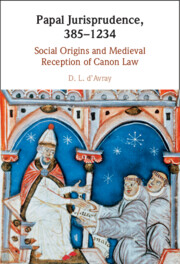Book contents
- Papal Jurisprudence, 385–1234
- Papal Jurisprudence, 385–1234
- Copyright page
- Dedication
- Contents
- Acknowledgements
- Abbreviations
- Sigla
- Introduction
- 1 Transformations and Long-Term Explanations
- 2 The Christian Roman Empire, c. 400
- 3 c. 400: Practical Complexities and Uncertainties
- 4 c. 400: Uncertainty about Grace
- 5 Papal Rulings and Ritual
- 6 Hierarchies
- 7 Clerical Status and Monks
- 8 Returning Heretics
- 9 Pelagianism and the Papacy
- 10 Leo I
- 11 Post-Imperial Syntheses
- 12 Early Papal Laws in the Barbarian West
- 13 Carolingian Culture and Its Legacy
- 14 1050–1150
- 15 Theology and Law
- 16 c. 400 and c. 1200: Complexity, Conversion, and Bigamia
- 17 Clerics in Minor Orders
- 18 Choosing Bishops
- Overall Conclusions
- Book part
- Select Bibliography
- Index
16 - c. 400 and c. 1200: Complexity, Conversion, and Bigamia
Published online by Cambridge University Press: 10 March 2022
- Papal Jurisprudence, 385–1234
- Papal Jurisprudence, 385–1234
- Copyright page
- Dedication
- Contents
- Acknowledgements
- Abbreviations
- Sigla
- Introduction
- 1 Transformations and Long-Term Explanations
- 2 The Christian Roman Empire, c. 400
- 3 c. 400: Practical Complexities and Uncertainties
- 4 c. 400: Uncertainty about Grace
- 5 Papal Rulings and Ritual
- 6 Hierarchies
- 7 Clerical Status and Monks
- 8 Returning Heretics
- 9 Pelagianism and the Papacy
- 10 Leo I
- 11 Post-Imperial Syntheses
- 12 Early Papal Laws in the Barbarian West
- 13 Carolingian Culture and Its Legacy
- 14 1050–1150
- 15 Theology and Law
- 16 c. 400 and c. 1200: Complexity, Conversion, and Bigamia
- 17 Clerics in Minor Orders
- 18 Choosing Bishops
- Overall Conclusions
- Book part
- Select Bibliography
- Index
Summary
The first and second decretal waves, c. 400 and c. 1200, both responded to unresolved complexities arising from the evolution of separate social systems. In the standard gloss on Gratian, ‘Gloss II’, decretals from the two ages are brought into conjunction. Innocent I’s ruling about pagan marriages was generating thoughtful discussion eight centuries after his death. The standard gloss discusses it together with a decretal of Innocent III. Between Innocent I and Innocent III, the ‘Pauline Privilege’ system emerges clearly into view, taken for granted by Innocent III after an evolution at which for want of evidence we can only guess. How to integrate the earlier Innocent’s ruling with the ‘Pauline Privilege’ system? This is an example of how the horizon of reflection about a text can be enlarged over time, without losing contact with the original meaning, as it is applied in new context and to complex scenarios not originally envisaged.
Keywords
- Type
- Chapter
- Information
- Papal Jurisprudence, 385–1234Social Origins and Medieval Reception of Canon Law, pp. 204 - 214Publisher: Cambridge University PressPrint publication year: 2022

